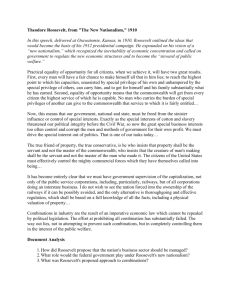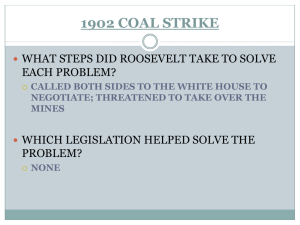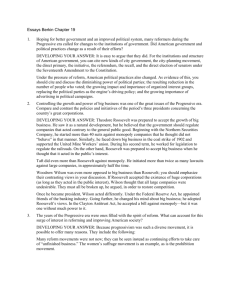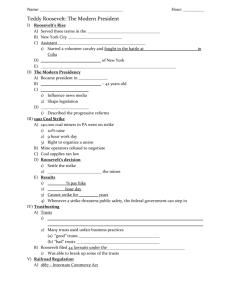This excerpt comes from a speech given by Roosevelt in Kansas in
advertisement
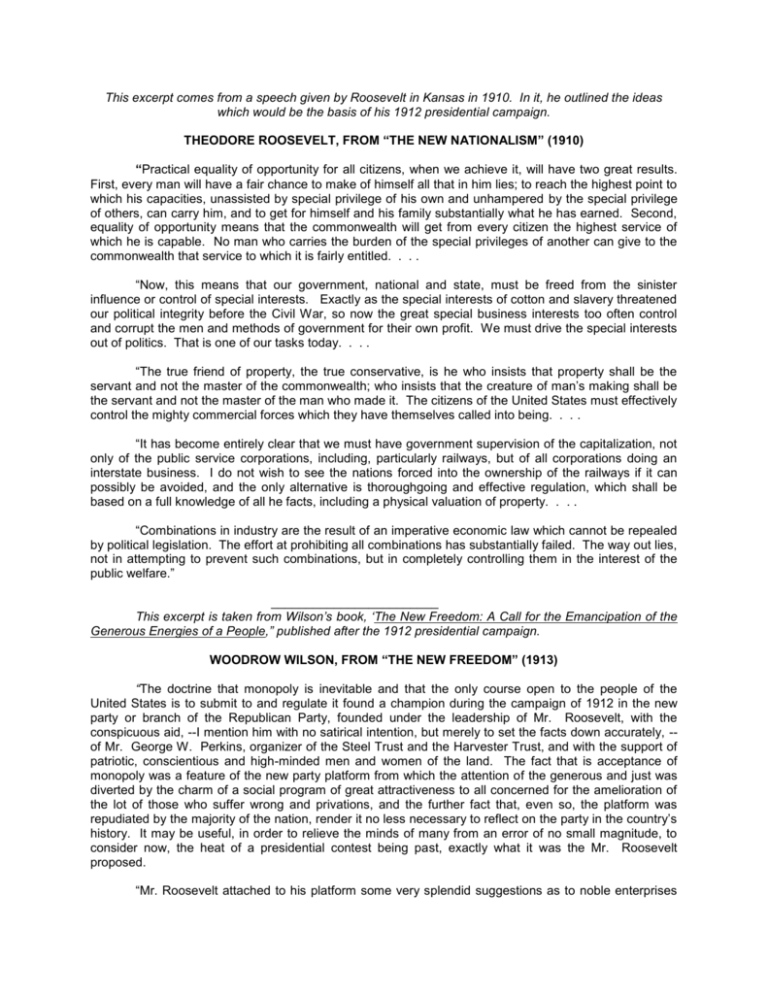
This excerpt comes from a speech given by Roosevelt in Kansas in 1910. In it, he outlined the ideas which would be the basis of his 1912 presidential campaign. THEODORE ROOSEVELT, FROM “THE NEW NATIONALISM” (1910) “Practical equality of opportunity for all citizens, when we achieve it, will have two great results. First, every man will have a fair chance to make of himself all that in him lies; to reach the highest point to which his capacities, unassisted by special privilege of his own and unhampered by the special privilege of others, can carry him, and to get for himself and his family substantially what he has earned. Second, equality of opportunity means that the commonwealth will get from every citizen the highest service of which he is capable. No man who carries the burden of the special privileges of another can give to the commonwealth that service to which it is fairly entitled. . . . “Now, this means that our government, national and state, must be freed from the sinister influence or control of special interests. Exactly as the special interests of cotton and slavery threatened our political integrity before the Civil War, so now the great special business interests too often control and corrupt the men and methods of government for their own profit. We must drive the special interests out of politics. That is one of our tasks today. . . . “The true friend of property, the true conservative, is he who insists that property shall be the servant and not the master of the commonwealth; who insists that the creature of man’s making shall be the servant and not the master of the man who made it. The citizens of the United States must effectively control the mighty commercial forces which they have themselves called into being. . . . “It has become entirely clear that we must have government supervision of the capitalization, not only of the public service corporations, including, particularly railways, but of all corporations doing an interstate business. I do not wish to see the nations forced into the ownership of the railways if it can possibly be avoided, and the only alternative is thoroughgoing and effective regulation, which shall be based on a full knowledge of all he facts, including a physical valuation of property. . . . “Combinations in industry are the result of an imperative economic law which cannot be repealed by political legislation. The effort at prohibiting all combinations has substantially failed. The way out lies, not in attempting to prevent such combinations, but in completely controlling them in the interest of the public welfare.” ________________________ This excerpt is taken from Wilson’s book, ‘The New Freedom: A Call for the Emancipation of the Generous Energies of a People,” published after the 1912 presidential campaign. WOODROW WILSON, FROM “THE NEW FREEDOM” (1913) “The doctrine that monopoly is inevitable and that the only course open to the people of the United States is to submit to and regulate it found a champion during the campaign of 1912 in the new party or branch of the Republican Party, founded under the leadership of Mr. Roosevelt, with the conspicuous aid, --I mention him with no satirical intention, but merely to set the facts down accurately, -of Mr. George W. Perkins, organizer of the Steel Trust and the Harvester Trust, and with the support of patriotic, conscientious and high-minded men and women of the land. The fact that is acceptance of monopoly was a feature of the new party platform from which the attention of the generous and just was diverted by the charm of a social program of great attractiveness to all concerned for the amelioration of the lot of those who suffer wrong and privations, and the further fact that, even so, the platform was repudiated by the majority of the nation, render it no less necessary to reflect on the party in the country’s history. It may be useful, in order to relieve the minds of many from an error of no small magnitude, to consider now, the heat of a presidential contest being past, exactly what it was the Mr. Roosevelt proposed. “Mr. Roosevelt attached to his platform some very splendid suggestions as to noble enterprises which we ought to undertake for the uplift of the human race; . . . If you have read the trust plank in that platform as often as I have read it, you have found it very long, but very tolerant. It did not anywhere condemn monopoly, except in words; its essential meaning was that the trusts have been bad and must be made to be good. You know that Mr. Roosevelt long ago classified trusts for us as good and bad, and he said he was afraid only of the bad ones. Now he does not desire that there should be any more of the bad ones, but proposed that they should all be made good by discipline, directly applied by a commission of executive appointment. All he explicitly complains of is lack of publicity and lack of fairness; not the exercise of power, for throughout that plank the power of the great corporations is accepted as the inevitable consequence of the modern organization of industry. All that is proposed to do is to take them under control and deregulation. “The fundamental part of such a program is that the trusts shall be recognized as a permanent part of our economic order, and that the government shall try to make trusts the ministers, the instruments, through which the life of this country shall be justly and happily developed on its industrial side. . . . “Shall we try to get the grip of monopoly away from our lives, or shall we not? Shall we withhold our hand and say monopoly is inevitable, that all we can do is to regulate it? Shall we say that all we can do is to put government in competition with monopoly and try its strength against it? Shall we admit that the creature of our own hands is stronger than we are? We have been dreading all along the time when the combined power of high finance would be greater than the power of the government.” -----------------ASSIGNMENT: Read the two excerpts from Roosevelt and Wilson and also study their activities and policies in your textbooks. In your own words in a page or two double spaced typed, what are the attitudes of each man on the subject of trusts and monopolies? Whose views do you consider to be the most correct? Explain your answer. How do the excerpts reflect the personalities of the authors? What policies did each man follow as President and why?

